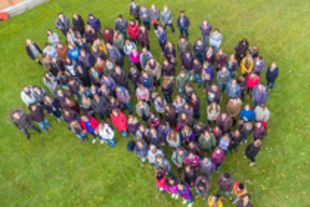On November 03, 2016, graduate students of Helmholtz Zentrum München met for the 9th HELENA Graduate Students’ Day. In addition to the annual graduate student prize, the day’s agenda included the election of new Graduate Student Representatives and a career lecture.
In his welcome address, PD Dr. Christian Langebartels, research director at Helmholtz Zentrum München and outgoing director of the HELENA Graduate School, reflected on the past and looked to the future. “The graduate school now has 360 members from 38 countries,” said Langebartels. “In addition, more than 100 PhD degrees are awarded each year.” The review in 2014 showed that important steps for career development have already been implemented. “With HELENA, the Postdoctoral Fellowship Program, Young Investigator Groups, and W2/W3 professorships, a complete career path is marked out,” he added.
Representatives of the Doctoral Students’ Initiative (DINI) presented the objectives of the DINI and invited graduate students to contact one of the DINI representatives whenever questions would arise. They asked all graduate students to participate in a planned helmholtzwide survey of Helmholtz Juniors.
Industry or academia?
The career lecture of Prof. Matthias von Herrath offered interesting insights into industrial and academic research. He is Associated Professor on tenure track at The Scripps Research Institute in La Jolla, USA. Since 2008 he is also head of the Diabetes Research Center and Professor of the Institute for Allergy and Immunology at La Jolla. The researcher encouraged all doctoral students to pursue other interests apart from biology, e.g. economy, computer modelling or statistics in order to hone their profile. This also includes professional skills such as writing publications or leading teams. To be prepared for all eventualities, career planning should include a “Plan B” or a “Plan C” besides a “Plan A”, von Herrath added. The right time to do this is during one’s PhD studies. According to von Herrath, both academic research and industrial research have advantages. He advised all those present to critically weigh the pros and cons for themselves.
Outstanding dissertations
The Graduate Students’ Award 2016 was awarded to three recipients for their outstanding dissertations. The Graduate Students’ Award is supported by HELENA and the Association of the Friends and Supporters of Helmholtz Zentrum München (VdFF). The coveted award is funded by Münchner Bank. Martin Göttlicher from the VdFF chaired the talks of the candidates and presented the prizes. He congratulated the three prizewinners for their outstanding achievements:
- Michael Laxy, IGM: Disease Management and Outcomes in Patients with Type 2 Diabetes and Cardiovascular Comorbidities. The Burden of Disease and the Effectiveness and Cost-Effectiveness of Strategies on the Health Care System, Physician, and Patient Level. Supervisor: Prof. Dr. Rolf Holle
- Mathias Arnold, IBIS: Supporting the evidence for human trait-associated genetic variants by computational biology methods and multi-level data integration. Supervisor: Prof. Dr. Hans-Werner Mewes
- Ilona Kammerl, iLBD: Proteasome and immunoproteasome function in cigarette smoke-mediated chronic lung disease. Supervisor: PD Dr. Silke Meiners
The HELENA team then congratulated and said “farewell” to all doctoral students who successfully completed their PhD degrees.
The day was concluded with a get-together in the foyer of the auditorium.


